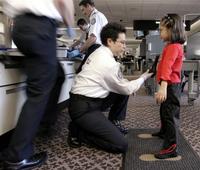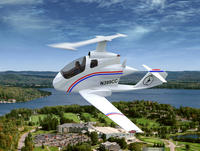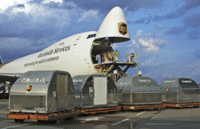-
Bomb-proof bag for planes' luggage compartment developed

The blast-absorbing bag, named the Fly-Bag, features multiple layers of novel fabrics, composites, and coatings and is designed to be filled with passenger luggage and then placed in the hold of a plane; if one of the pieces of luggage inside the Fly-Bag had a bomb in it and the bomb exploded during the flight, the resulting blast would be absorbed by the bag owing to its complex fabric structure, preventing damage to the plane; fundamental to the design of the bag is the internal elastomeric coating and impregnation of fabric with Shear Thickening Fluids (STF); STFs work by increasing in viscosity in response to impact
-
-
Documents reveal TSA ignored dangers of body scanners
The Electronic Privacy Information Center (EPIC) says that is has official documents that reveal the Transportation Security Administration (TSA) deliberately ignored warnings that airport body scanners pose a health risk; the internal documents and email exchanges show that TSA officials brushed aside concerns that employees raised after noticing that a large number of workers had cancer, strokes, and heart disease after working near the body scanners
-
-
RAILENIUM awarded 550 million Euro boost from French government
RAILENIUM, the European Institute for Technological Research in Rail Infrastructure, has been selected by the French government as a leading investment project and has been awarded 550 million Euros in funding; the equipment and research platforms that RAILENIUM will provide will be unique in Europe; this will include a 5 km rail test loop, a tramway test track, a fatigue-simulation track, running trial facilities, and service structures
-
-
Elderly woman forced to fly without adult diaper
A 95-year old woman dying of leukemia was planning on flying from Florida to her native Michigan so she could spend the last months of her life closer to her family cemetery plot; she was subjected to a 45-minute security examination at a Florida airport; two female agents discovered that the wheel-chair bound woman was wearing a Depend adult diaper, and insisted that unless the diaper was removed, the woman would not be allowed to fly
-
-
U.S. no longer mandating 100 percent screening of cargo containers

DHS Secretary Janet Napolitano announced that the United States is no longer going to screen every cargo container before it enters the United States; she said, “We believe the so-called 100 percent requirement is probably not the best way to go”; in 2007 Congress mandated that all containers entering the United States must be scanned at their ports of exit by 2012; the 2007 bill empowers DHS to extend the 2012 deadline if the agency believed that the goal was not achievable and in the past Napolitano has expressed doubts about the feasibility of screening 100 percent of the cargo entering the United States
-
-
TSA hopes to limit child patdowns

On Wednesday the head of Transportation security Administration (TSA) said the agency was working to make security screening procedures less intrusive for small children; airport screeners will be instructed to make repeated attempts to screen children using electronic methods; the agency hopes that this will limit, but not eliminate, the number of children receiving pat downs
-
-
EU lawyers say U.S. – EU plans air passenger database illegal
A British newspaper has obtained a confidential government document that reveals a legal opinion stating that the U.S.-EU air passenger database plan is “not compatible with fundamental rights” ; DHS and European officials had reached an agreement to share the personal information of passengers including credit card numbers, travel plans, birth dates, and addresses
-
-
New commuting method: Personal Aerial Vehicles

Researchers in Germany have an idea for solving the growing congestions in urban centers: a Personal Aerial Vehicles (PAVs) for traveling between homes and working places; the PAVs will fly at low altitude in urban environments, thus making it unnecessary to change current air-traffic control regulations
-
-
Houston police nab TSA thief
In a sting operation, Houston police office arrested a Transportation Security Administration (TSA) screener for stealing from passengers at the city’s Intercontinental Airport; Houston’s Intercontinental Airport has had a history of reported thefts; in August 2003 local police arrested another TSA screener for stealing items from passenger’s bags
-
-
House wants to know about racial profiling at Newark airport
After a federal report revealed that behavior detection officers (BDOs) at New Jersey’s Newark airport routinely used racial profiling to screen passengers, the heads of the House Homeland Security Committee are demanding answers; according to the January 2010 report, in an effort to boost its performance numbers and appear productive, Newark’s BDO unit began singling out Hispanic passengers for additional screening, searches, and questioning in 2008 and 2009
-
-
U.K. bans UPS air cargo screening

The U.K. government appears to have lost confidence in the security screening procedure of UPS – and has now banned UPS from screening air cargo at some facilities in the United Kingdom; last year, a printer filled with explosives was found on a UPS U.S.-bound flight — but the printer was found not because of UPS screnning but owing to a tip-off from an informer; in March, the U.K. security services placed a fake bomb on an Istanbul-bound UPS flight, and the bomb made it to Turkey without being detected
-
-
New Jersey lawmakers protest transit security cuts
On Tuesday Senator Frank Lautenberg (D-New Jersey) and Representative Rush Holt (D-New Jersey) urged lawmakers to restore funding for security measures to the nation’s railways; the House budget would cut funding for nine homeland security programs by 55 percent next fiscal year; in particular, funding to secure intercity passenger rail lines, freight trains, and mass transit systems would fall to $113 million down from $250 million, a 45 percent cut
-
-
Railroad protests $400 million in fines for smuggling drugs
Railroad companies are protesting nearly $400 million in fines for illegal drugs smuggled aboard its trains; under U.S. law, all shipping companies are subject to fines of $500 per ounce of marijuana and $1,000 per ounce of heroin or cocaine if U.S. Customs and Border Protection agents find drugs hidden in their cargo; Union Pacific argues that they are being punished for the actions of drug smugglers which they cannot control
-
-
New Jersey Transit unveils new terror text hotline
NJ Transit recently unveiled its new “Text Against Terror” initiative and is encouraging public transportation riders to report any suspicious items they see via text; the New Jersey transit system is the third largest in the nation with an estimated one million riders per day; New Jersey Transit officials are hoping to enlist the aid of its passengers in the fight against terror.
-
-
Mud triggers Logan alarm
Scanning machines at Logan Airport detected minute traces of nitrates in a checked luggage, and sounded the alarm; two gates were evacuated as a precaution; police found that the nitrates emanated from mud sample a Honk Kong University doctoral student was carrying in the luggage; the samples were to be used in research
-
More headlines
The long view
New Technology is Keeping the Skies Safe
DHS S&T Baggage, Cargo, and People Screening (BCP) Program develops state-of-the-art screening solutions to help secure airspace, communities, and borders
